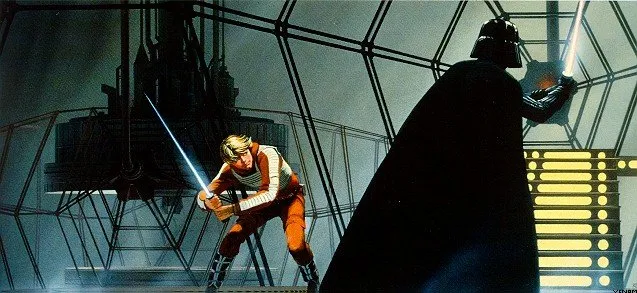Darth Vader is more than a character; he is a cultural icon, epitomizing the intersection of myth, morality, and the human condition within the framework of science fiction. His debut in 1977's "Star Wars: Episode IV – A New Hope," directed by George Lucas, introduced audiences to a figure who would become the personification of villainy and complexity.
Vader's journey from the promising young Jedi, Anakin Skywalker, to the Sith Lord is a narrative steeped in themes of corruption, redemption, and identity, which has become a cornerstone for storytelling within the genre, influencing countless narratives and character archetypes in science fiction and beyond.
The Origins of a Name: Etymological Beginnings and Narrative Intent
The etymology of Darth Vader's name is a fusion of creative linguistics and the evolving nature of character development. 'Darth,' now an established title for practitioners of the Sith way, initially served as a sinister signifier, its phonetic harshness evoking darkness and authority. The choice of 'Vader,' although coincidentally similar to the Dutch word for 'father,' was not originally intended to signify paternal lineage.In the nascent stages of the "Star Wars" story, Lucas's script drafts did not prescribe the complex father-son relationship that would later become central to the saga, reflecting the organic development of character roles and names in storytelling.
"Dark Father" Theory: Linguistic Coincidence Versus Intentional Foreshadowing
The "Dark Father" theory posits that Lucas intentionally chose the name 'Vader' to foreshadow the character's relationship with Luke Skywalker. However, this theory largely relies on retrospective interpretation and the coincidental phonetic resemblance to the Dutch 'vader.' It's important to recognize the transformative nature of linguistic interpretation in the context of narrative development.The theory, while intriguing, tends to eclipse the genuine creative process, which was not initially grounded in the revelation that would define Vader's legacy. Lucas's vision for the character was still emergent when the name was conceived, highlighting the serendipitous evolution of story elements in film.
Scripting the Skywalker Saga: The Emergence of a Paternal Twist
The transformation of Darth Vader into Luke Skywalker's father is a narrative twist that emerged during the development of "The Empire Strikes Back." This plot point was the result of creative deliberation and script evolution, as documented in various interviews and script revisions made by Lucas and screenwriter Lawrence Kasdan.The decision to connect Vader and Skywalker as father and son was not predestined from Vader's inception but was instead a pivotal narrative choice that arose from storytelling necessity and character exploration, highlighting the often unpredictable journey of cinematic storytelling.
Naming as Legacy: The Influence of Vader in Science Fiction
The legacy of Vader's name extends beyond the "Star Wars" canon, influencing the lexicon of science fiction at large. The prefix 'Darth' has become an emblematic title within the Sith hierarchy, shaping the way villains are named and perceived in the genre.
Moreover, the name 'Vader' has inspired the practice of embedding character names with thematic significance, prompting creators to consider the implicit power and symbolism in naming. Darth Sidious anyone....?
This phenomenon reflects the broader impact of "Star Wars" on the genre, where naming conventions carry the weight of narrative and thematic implication.
Concluding Reflections: The Power of Names in Narrative Mythology
In examining the origins and impact of Darth Vader's name, we confront the essence of myth-making. Names in science fiction are not merely identifiers; they are conduits of narrative potential, embodying the stories they tell and the characters they represent. The ongoing discourse surrounding Vader's name exemplifies how the meanings attributed to a character can evolve and proliferate beyond their original conception.It is a testament to the collaborative dance between creator and audience, where the creation of a name can echo through the halls of cultural memory, shaping and being shaped by the collective understanding of a mythos.
This in-depth exploration not only deepens our appreciation for the "Star Wars" narrative but also invites us to consider the complex interplay between language, storytelling, and cultural interpretation that is at the heart of science fiction's enduring allure.
This in-depth exploration not only deepens our appreciation for the "Star Wars" narrative but also invites us to consider the complex interplay between language, storytelling, and cultural interpretation that is at the heart of science fiction's enduring allure.











